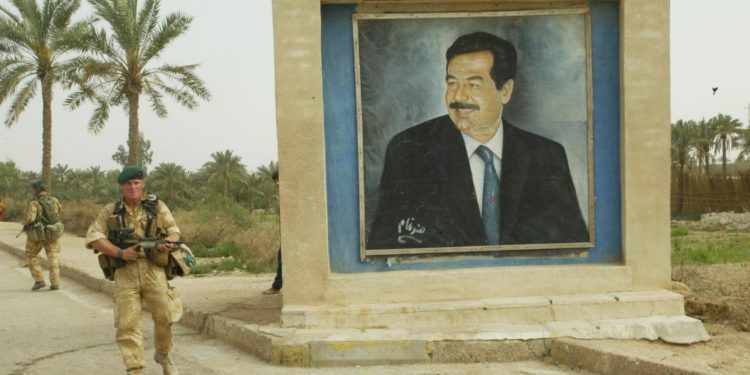As they were leaving the area, they came upon an Iraqi police checkpoint and decided to try to talk their way out of an increasingly bad situation, but to no avail.
With an angered mob gathering, the Iraqi policemen handcuffed the SAS troopers and took them to the Al-Jamiat police station.
Screw the Brass
The team to which the SAS operators belonged was too small to launch a rescue on its own, so they requested urgent reinforcements from Baghdad, where the main SAS contingent had its headquarters in the Green Zone, right next to Delta Force.
As the SAS commandos were preparing to rescue their own, the officer-in-charge received a call from the U.K., ordering him to stand down any rescue attempts. The SAS operators, including the unit’s commanding officer, were dumbfounded.
The bureaucrats in London had also been taken by surprise and were slow to react. The political situation in the recently liberated Iraq was precarious. A complicated insurgency made up of terrorist groups and Sunni and Shia militias was threatening to destroy the very fabric of Iraqi society.
This political quagmire was the only rational reason for the senior leadership’s hesitation to rescue their own.
However reasoned that decision was, it was unacceptable for the SAS, whose leaders decided to disobey orders in this critical moment, risking court-martial to save their own.
Meanwhile, the situation inside the police station was deteriorating. The Iraqi policemen issued a statement, accusing the two British commandos of subversion, and published pictures of the operators looking harangued and beaten.
The Iraqis also put the British commandos through several mock executions.
“They had a pistol up against the back of my head, then there would be a click. There was lots of shouting, but I couldn’t really tell what they were saying. They were going to execute us,” Maclachlan told The Scotsman in 2009.
An assault troop of 20 SAS operators from A Squadron and roughly 40 paratroopers from the Special Forces Support Group (SFSG) flew to Basra. (SFSG is a specialist unit designed to support other British special operations forces.)
“I was keeping myself mentally alert and I still had faith in my SAS colleagues coming to get me, though. But being at the sharp end of this incident, I had no idea about the hoo-hah which went on,” Maclachlan said.
As reinforcements were en route, the British military sent in a mechanized infantry company to try and negotiate the release of the two commandos. That effort failed, and those regular troops had to evacuate after a mob of Iraqis attacked them with stones and Molotov cocktails, setting one armored personnel carrier ablaze and lightly wounding several British soldiers.
The situation was getting worse by the hour.
“Who Dares Wins”
With the reinforcements in Basra, the SAS launched another rescue attempt with helicopter and mechanized infantry support.
They stormed the Al-Jamiat police station, rolled over the wall surrounding the compound, assaulted the building, and took the Iraqis by surprise. But their colleagues had already been moved.
During an impromptu interrogation, Iraqi policemen revealed that the two SAS captives had been taken to a nearby compound. The ground force regrouped and made up another assault plan on the fly.
Once they reached the compound, they stormed the building through numerous entry points, a classic hostage-rescue tactic meant to disorient the captors and prevent them from killing the hostages.
At first, the rescue force couldn’t find the captive SAS troopers and feared they had been moved again. But in another sweep of the compound, the task force found the two SAS operators handcuffed in a bathroom — beaten and disheveled but alive.
On that September day, the SAS leadership took a great risk, mutinying to save their colleagues. But it was a calculated risk that paid off. British political and military leadership gave post facto permission for the rescue attempt. The SAS lived by their motto: “Who Dares Wins.”
This article was written by Stavros Atlamazoglou and originally published on the Insider.










COMMENTS